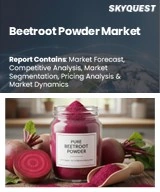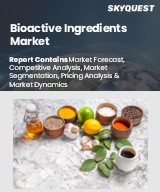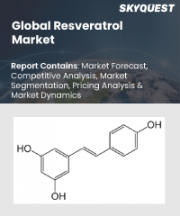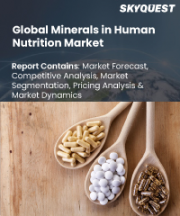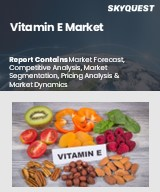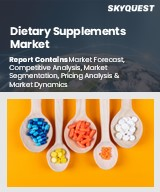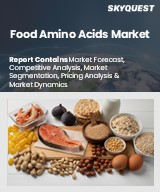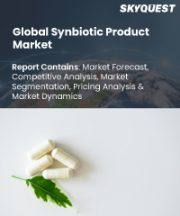
|
시장보고서
상품코드
1423705
식이보충제 시장 예측(-2030년) : 제품 유형, 형태, 유통 채널, 용도별, 지역별 세계 분석Dietary Supplements Market Forecasts to 2030 - Global Analysis By Product Type (Prebiotics & Probiotics, Proteins and Amino Acids, Herbal Supplements and Other Product Types), Form, Distribution Channel, Application and By Geography |
||||||
Stratistics MRC에 따르면 세계의 식이보충제 시장은 2023년에 1,820억 4,000만 달러를 차지하고 예측 기간 중 CAGR 11.0%로 성장하며, 2030년에는 3,779억 4,000만 달러에 달할 것으로 예측되고 있습니다.
식이보충제 시장은 비타민, 미네랄, 허브, 아미노산 또는 식단을 보충하고 전반적인 건강과 웰빙에 기여하는 것을 목표로 하는 기타 물질을 함유한 제품을 생산 및 판매하는 산업을 말합니다. 이러한 보충제는 정제, 캡슐, 분말, 액체 등 다양한 형태로 제공되며, 영양 결핍을 해결하거나 특정 건강 목표를 지원하거나 전반적인 건강을 증진하도록 설계되어 있습니다. 또한 식이보충제는 뼈 건강 증진, 면역 기능 지원, 노화 및 어린이 및 노인과 같은 특정 계층의 우려에 대응하는 등 전문 분야에서도 역할을 수행합니다.
국립보건연구원에 따르면 2019년 건강보조식품 판매량이 38% 증가했다고 합니다. 건강 보조 식품은 미량 영양소 결핍을 개선하거나 충분한 섭취량을 유지하는 데 사용할 수 있으므로 건강한 사람들의 수가 증가하고 있습니다.
높아지는 건강 의식
건강을 유지하는 데 있으며, 영양의 역할에 대한 개인의 지식이 높아짐에 따라 예방적 건강관리의 중요성이 강조되고 있습니다. 소비자들은 식이보충제를 통해 건강을 증진하고 잠재적인 영양 결핍을 해결할 수 있는 방법을 적극적으로 모색하고 있습니다. 영양과 라이프스타일을 포괄하는 종합적인 건강 접근법에 대한 열망은 필수 비타민, 미네랄 및 기타 유익한 화합물을 함유한 보충제에 대한 수요를 촉진하고 있습니다. 또한 이러한 인식은 스포츠 식이보충제를 찾는 젊은 층부터 노화에 따른 특정 건강 문제를 지원하고자 하는 노년층에 이르기까지 다양한 계층으로 확대되고 있습니다.
표준화 부족
건강보조식품에 따라 용법, 용량, 배합, 품질 기준이 제각각인 것은 소비자와 의료 전문가 모두에게 혼란을 야기할 수 있습니다. 통일된 가이드라인이 없으면 제품의 품질과 효능에 차이가 발생할 위험이 있으며, 보충제 섭취에 대한 표준화된 접근 방식을 확립하기 어렵습니다. 명확한 섭취 권장량이 없기 때문에 부적절한 사용으로 인해 부작용이 발생하거나 보충제의 효능이 떨어질 수 있습니다. 그러나 표준화의 부족은 종합적인 연구와 임상시험을 수행하는 능력을 방해하고 다양한 보충제의 효과와 안전성을 지원하는 확실한 과학적 증거를 축적하는 데 방해가 되고 있습니다.
제품 제형의 혁신
업계의 끊임없는 연구개발 노력은 효능, 생체 이용률, 소비자 선호도를 향상시키는 새로운 첨단 제제 및 보충제 개발을 촉진하고 있습니다. 이러한 혁신에는 종종 새로운 성분의 배합, 전달 방법의 개선, 특정 건강 문제를 해결하기 위한 표적 솔루션의 개발 등이 포함됩니다. 예를 들어 캡슐화 기술의 발전과 새로운 생리활성 화합물의 사용은 영양 흡수를 최적화한 보충제 개발에 기여하고 있습니다.
윤리적 및 환경적 문제
식물 성분의 남획, 의심스러운 노동 관행, 특정 조달 방식에 따른 환경 악화 등의 문제는 윤리적 문제를 제기합니다. 소비자들은 포장 폐기물과 이산화탄소 배출량 등 보충제 제조가 환경에 미치는 영향에 대해 더 큰 관심을 갖고 있습니다. 책임감 있게 조달된 친환경 보충제에 대한 수요는 업계가 공급망 전반에 걸쳐 지속가능한 관행을 채택하도록 요구하고 있습니다.
COVID-19의 영향 :
공급망, 제조 및 유통 채널의 혼란은 업계에 도전이 되고 있습니다. 봉쇄, 경제 불확실성, 소비자 소비 패턴의 변화는 개인의 구매 행동에 영향을 미치고 전체 시장 역학에 영향을 미치고 있습니다. 또한 이번 팬데믹은 건강기능식품의 가용성과 안전성을 보장하는 데 있으며, 탄력적이고 투명한 공급망의 중요성을 강조하고 있습니다. 장기적인 영향으로는 건강 및 웰빙에 대한 강조가 건강기능식품 시장의 적응력과 혁신의 필요성과 함께 건강 및 웰빙에 대한 강조가 증가할 것으로 보입니다.
예측 기간 중 어린이용 보충제 분야가 가장 클 것으로 예상
아이들의 전반적인 건강을 위해 영양이 중요하다는 부모들의 인식이 높아짐에 따라 어린이용 보충제 시장은 예측 기간 중 가장 큰 규모를 형성할 것으로 예상됩니다. 자녀의 건강과 발달에 대한 관심이 높아짐에 따라 자녀가 필요한 비타민과 미네랄을 섭취할 수 있도록 식이보충제를 이용하는 부모들이 증가하고 있습니다. 구미젤리, 츄어블 정제와 같은 혁신적이고 매력적인 제형이 급증하면서 어린이들이 보충제를 더 쉽게 섭취할 수 있게 되었습니다. 또한 소아과 의사와 의료 전문가들은 아이들의 식생활에서 영양 부족을 해결하기 위해 식이보충제 사용을 적극적으로 지지하고 있습니다.
예측 기간 중 가장 높은 CAGR을 보일 것으로 예상되는 분야는 심장 건강 분야입니다.
심장 건강 분야는 예측 기간 중 가장 높은 CAGR을 기록할 것으로 예상됩니다. 건강한 심장을 유지하는 데 있으며, 영양의 역할에 대한 인식이 높아지면서 오메가 3 지방산, 코엔자임Q10, 식물성 스테롤 등 심혈관에 좋은 것으로 알려진 성분을 함유한 건강기능식품에 대한 관심이 높아지고 있습니다. 또한 좌식 생활과 식습관의 변화로 인해 심장에 좋은 생활습관을 보완하는 건강기능식품에 대한 수요가 증가하고 있습니다. 또한 각 제조업체들은 건강관리 전문가들의 지지를 받아 심혈관 건강 증진을 목표로 하는 특수한 제제를 출시하며 대응하고 있습니다.
가장 큰 점유율을 차지하는 지역
추정 기간 중 아시아태평양은 시장에서 가장 큰 점유율을 차지할 것으로 예상됩니다. 급속한 도시화, 라이프스타일 변화, 예방 헬스케어에 대한 관심 증가로 인해 건강 보조 식품의 중요성에 대한 인식이 높아지고 있습니다. 가처분 소득 증가로 중산층이 증가하여 건강 보조 식품을 포함한 건강 및 웰빙 제품에 대한 투자가 가능해졌습니다. 또한 아유르베다와 중국 전통 의학 등의 전통 관습은 이 지역에서 허브와 천연 보충제의 수용에 기여하고 있습니다.
CAGR이 가장 높은 지역 :
아시아태평양은 예측 기간 중 유리한 성장세를 보일 것으로 예상됩니다. 각국 정부의 규제 명확화와 엄격한 품질 기준 강화로 인해 건강기능식품의 안전성과 효능에 대한 소비자의 신뢰가 높아지고 있습니다. 규제기관은 제품 라벨링, 제조 관행, 성분 안전에 대한 명확한 가이드라인을 마련하여 제품의 품질과 진위 여부에 대한 우려를 해소하기 위해 적극적으로 노력하고 있습니다. 또한 정부는 공중 보건과 건강 유지를 우선시하기 위해 건강 보조 식품 산업의 연구개발 구상을 지원하고 있습니다.
무료 맞춤형 서비스 :
이 보고서를 구독하는 고객은 다음과 같은 무료 맞춤화 옵션 중 하나를 사용할 수 있습니다. :
- 기업 개요
- 추가 시장 기업의 종합적인 프로파일링(최대 3사)
- 주요 기업의 SWOT 분석(최대 3사)
- 지역 세분화
- 고객의 관심에 따른 주요 국가별 시장 추정치, 예측, CAGR(주: 타당성 확인에 따라 다름)
- 경쟁사 벤치마킹
- 제품 포트폴리오, 지역적 입지, 전략적 제휴를 기반으로 한 주요 기업 벤치마킹
목차
제1장 주요 요약
제2장 서문
- 개요
- 이해관계자
- 조사 범위
- 조사 방법
- 데이터 마이닝
- 데이터 분석
- 데이터 검증
- 조사 어프로치
- 조사 소스
- 1차 조사 소스
- 2차 조사 소스
- 전제조건
제3장 시장 동향 분석
- 촉진요인
- 억제요인
- 기회
- 위협
- 제품 분석
- 애플리케이션 분석
- 신흥 시장
- 신종 코로나바이러스 감염증(COVID-19)의 영향
제4장 Porter's Five Forces 분석
- 공급 기업의 교섭력
- 구매자의 교섭력
- 대체품의 위협
- 신규 진출업체의 위협
- 경쟁 기업간 경쟁 관계
제5장 세계의 식이보충제 시장 : 제품 유형별
- 프리바이오틱스와 프로바이오틱스
- 단백질과 아미노산
- 허브 보충제
- 비타민과 미네랄
- 미용과 안티에이징 보충제
- 소아용 보충제
- 오메가 3 지방산
- 시니어용 건강보조제
- 특수 보충제
- 스포츠 영양학
- 체중 관리
- 기타 제품 유형
제6장 세계의 식이보충제 시장 : 형태별
- 액체
- 소프트젤
- 구미
- 분말
- 기타 형식
제7장 세계의 식이보충제 시장 : 유통 채널별
- 온라인 소매 채널
- 슈퍼마켓/하이퍼마켓
- 약국·드러그스토어
제8장 세계의 식이보충제 시장 : 용도별
- 피부/헤어/네일
- 당뇨병
- 심장 건강
- 위장 건강
- 에너지와 체중 관리
- 뼈와 관절 건강
- 일반 건강
- 기타 용도
제9장 세계의 식이보충제 시장 : 지역별
- 북미
- 미국
- 캐나다
- 멕시코
- 유럽
- 독일
- 영국
- 이탈리아
- 프랑스
- 스페인
- 기타 유럽
- 아시아태평양
- 일본
- 중국
- 인도
- 호주
- 뉴질랜드
- 한국
- 기타 아시아태평양
- 남미
- 아르헨티나
- 브라질
- 칠레
- 기타 남미
- 중동 및 아프리카
- 사우디아라비아
- 아랍에미리트
- 카타르
- 남아프리카공화국
- 기타 중동 및 아프리카
제10장 주요 발전
- 계약, 파트너십, 협업, 합병사업
- 인수합병
- 신제품의 발매
- 사업 확대
- 기타 주요 전략
제11장 기업 개요
- Bayer AG
- Amway Corporation
- Herbalife Nutrition
- Pfizer Inc
- Abbott Laboratories
- Haleon Plc
- Suntory Holdings Ltd
- Otsuka Holdings Co. Ltd
- Glanbia PLC
- The Bountiful Company
- Bionova Lifesciences
- Carlyle Group
- Arkopharma Laboratoires Pharmaceutiques
According to Stratistics MRC, the Global Dietary Supplements Market is accounted for $182.04 billion in 2023 and is expected to reach $377.94 billion by 2030 growing at a CAGR of 11.0% during the forecast period. The dietary supplements market refers to the industry that produces and markets products containing vitamins, minerals, herbs, amino acids, or other substances intended to supplement the diet and contribute to overall health and well-being. These supplements come in various forms, such as pills, capsules, powders, and liquids, and are designed to address nutritional deficiencies, support specific health goals, or enhance overall wellness. Additionally, dietary supplements play a role in specialized areas such as promoting bone health, supporting immune function, and addressing concerns related to aging or specific demographic groups like children or seniors.
According to the National Institute of Health, the sales of dietary supplements increased at a rate of 38% in 2019. Growing numbers of healthy people are taking dietary supplements as they can be used to correct micronutrient deficiency or maintain an adequate intake.
Market Dynamics:
Driver:
Growing health awareness
As individuals become more informed about the role of nutrition in maintaining overall health, there is a heightened emphasis on preventive healthcare practices. Consumers are proactively seeking ways to enhance their well-being and address potential nutritional deficiencies through the use of dietary supplements. The desire for a holistic approach to health, encompassing nutrition and lifestyle, has fueled the demand for supplements containing essential vitamins, minerals, and other beneficial compounds. Moreover, this awareness extends to various demographic groups, from young adults seeking sports nutrition supplements to seniors aiming to support specific health concerns associated with aging.
Restraint:
Lack of standardization
Variability in dosages, formulations, and quality standards across different supplements can create confusion for consumers and healthcare professionals alike. Without uniform guidelines, there is a risk of inconsistent product quality and efficacy, making it challenging to establish a standardized approach to supplement consumption. The absence of clear dosing recommendations can lead to improper use, potentially causing adverse effects or diminishing the perceived effectiveness of supplements. However, the lack of standardization hampers the ability to conduct comprehensive research and clinical trials, hindering the accumulation of robust scientific evidence supporting the efficacy and safety of various supplements.
Opportunity:
Innovations in product formulations
Continuous research and development efforts within the industry lead to novel and advanced formulations, fostering the creation of supplements with improved efficacy, bioavailability, and consumer appeal. These innovations often involve the incorporation of new ingredients, enhanced delivery methods, and the development of targeted solutions to address specific health concerns. For instance, advancements in encapsulation technologies and the utilization of novel bioactive compounds contribute to the creation of supplements with optimized nutrient absorption.
Threat:
Ethical and environmental concerns
Issues such as overharvesting of botanical ingredients, questionable labor practices, and environmental degradation associated with certain sourcing methods raise ethical considerations. Consumers are becoming more conscious of the environmental impact of supplement production, including packaging waste and carbon footprints. The demand for responsibly sourced and eco-friendly supplements challenges the industry to adopt sustainable practices throughout the supply chain.
Covid-19 Impact:
Disruptions in the supply chain, manufacturing, and distribution channels have posed challenges for the industry. Lockdowns, economic uncertainties, and shifts in consumer spending patterns have influenced the purchasing behavior of individuals, impacting overall market dynamics. Additionally, the pandemic has highlighted the importance of a resilient and transparent supply chain in ensuring the availability and safety of dietary supplements. The long-term impact will likely involve an increased emphasis on health and wellness, coupled with a need for adaptability and innovation within the dietary supplements market.
The children's supplements segment is expected to be the largest during the forecast period
Children's supplements segment is expected to be the largest during the forecast period due to growing awareness among parents about the importance of nutrition for their children's overall well-being. As concerns about children's health and development rise, parents are increasingly turning to dietary supplements to ensure their kids receive essential vitamins and minerals. The market has responded with a surge in innovative and appealing formulations, such as gummies and chewable tablets, making it easier for children to consume these supplements. Additionally, pediatricians and healthcare professionals are actively endorsing the use of dietary supplements to address nutritional gaps in children's diets.
The cardiac health segment is expected to have the highest CAGR during the forecast period
Cardiac health segment is expected to have the highest CAGR during the forecast period. With rising awareness about the role of nutrition in maintaining a healthy heart, individuals are turning to dietary supplements containing ingredients like omega-3 fatty acids, Coenzyme Q10, and plant sterols known for their cardiovascular benefits. Moreover, a sedentary lifestyle and poor dietary habits have spurred the demand for supplements that can complement heart-healthy lifestyles. Moreover, manufacturers are responding by introducing specialized formulations targeted at promoting cardiovascular well-being, endorsed by healthcare professionals.
Region with largest share:
Asia Pacific region commanded the largest share of the market throughout the extrapolated period. Rapid urbanization, changing lifestyles, and an increasing focus on preventive healthcare have led to a heightened awareness of the importance of nutritional supplementation. Growing disposable incomes have enabled a rising middle class to invest in health and wellness products, including dietary supplements. Moreover, traditional practices such as Ayurveda and Traditional Chinese Medicine have contributed to the acceptance of herbal and natural supplements in the region.
Region with highest CAGR:
Asia Pacific region is estimated to witness lucrative growth over the projected period. Increased regulatory clarity and stringent quality standards enforced by governments across the region have bolstered consumer confidence in the safety and efficacy of dietary supplements. Regulatory bodies are actively working to establish clear guidelines for product labeling, manufacturing practices, and ingredient safety, addressing concerns related to product quality and authenticity. Furthermore, as governments prioritize public health and wellness, they are also supporting research and development initiatives in the dietary supplements industry.
Key players in the market
Some of the key players in Dietary Supplements market include Bayer AG, Amway Corporation, Herbalife Nutrition, Pfizer Inc, Abbott Laboratories, Haleon Plc, Suntory Holdings Ltd, Otsuka Holdings Co. Ltd, Glanbia PLC, The Bountiful Company, Bionova Lifesciences, Carlyle Group and Arkopharma Laboratoires Pharmaceutiques.
Key Developments:
In September 2022, Abbott launched a brand-new Ensure formulation with HMB. As a science-based nutritional supplement, the new Ensure contains 32 essential nutrients such as protein, calcium, and vitamin D to help improve muscle and bone strength. It contains HMB or hydroxy-methyl butyrate, a new ingredient that helps counteract muscle loss and increases the strength and power of the body.
In August 2022, Optimum Nutrition, a Glanbia Performance Nutrition brand, launched its brand-new Gold Standard Protein Shake. The new drink has two flavors: chocolate and vanilla. Each serving contains 24 grams of protein.
In March 2022, PharmaNutrics launched five different dietary supplements in the United States. SerotomixPlus, GlucanPlus, Gaba 600, EnergixPlux, and CurcumixPlux serve different purposes for fatigue, stress, musculoskeleton, and anti-inflammatory support.
Product Types Covered:
- Prebiotics & Probiotics
- Proteins and Amino Acids
- Herbal Supplements
- Vitamins & Minerals
- Beauty and Anti-Aging Supplements
- Children's Supplements
- Omega-3 Fatty Acids
- Senior Health Supplements
- Specialty Supplements
- Sports Nutrition
- Weight Management
- Other Product Types
Forms Covered:
- Liquids
- Softgels
- Gummies
- Powders
- Other Forms
Distribution Channels Covered:
- Online Retail Channels
- Supermarkets/Hypermarkets
- Pharmacies and Drug Stores
Applications Covered:
- Skin/Hair/Nails
- Diabetes
- Cardiac Health
- Gastrointestinal Health
- Energy & Weight Management
- Bone & Joint Health
- General Health
- Other Applications
Regions Covered:
- North America
- US
- Canada
- Mexico
- Europe
- Germany
- UK
- Italy
- France
- Spain
- Rest of Europe
- Asia Pacific
- Japan
- China
- India
- Australia
- New Zealand
- South Korea
- Rest of Asia Pacific
- South America
- Argentina
- Brazil
- Chile
- Rest of South America
- Middle East & Africa
- Saudi Arabia
- UAE
- Qatar
- South Africa
- Rest of Middle East & Africa
What our report offers:
- Market share assessments for the regional and country-level segments
- Strategic recommendations for the new entrants
- Covers Market data for the years 2021, 2022, 2023, 2026, and 2030
- Market Trends (Drivers, Constraints, Opportunities, Threats, Challenges, Investment Opportunities, and recommendations)
- Strategic recommendations in key business segments based on the market estimations
- Competitive landscaping mapping the key common trends
- Company profiling with detailed strategies, financials, and recent developments
- Supply chain trends mapping the latest technological advancements
Free Customization Offerings:
All the customers of this report will be entitled to receive one of the following free customization options:
- Company Profiling
- Comprehensive profiling of additional market players (up to 3)
- SWOT Analysis of key players (up to 3)
- Regional Segmentation
- Market estimations, Forecasts and CAGR of any prominent country as per the client's interest (Note: Depends on feasibility check)
- Competitive Benchmarking
- Benchmarking of key players based on product portfolio, geographical presence, and strategic alliances
Table of Contents
1 Executive Summary
2 Preface
- 2.1 Abstract
- 2.2 Stake Holders
- 2.3 Research Scope
- 2.4 Research Methodology
- 2.4.1 Data Mining
- 2.4.2 Data Analysis
- 2.4.3 Data Validation
- 2.4.4 Research Approach
- 2.5 Research Sources
- 2.5.1 Primary Research Sources
- 2.5.2 Secondary Research Sources
- 2.5.3 Assumptions
3 Market Trend Analysis
- 3.1 Introduction
- 3.2 Drivers
- 3.3 Restraints
- 3.4 Opportunities
- 3.5 Threats
- 3.6 Product Analysis
- 3.7 Application Analysis
- 3.8 Emerging Markets
- 3.9 Impact of Covid-19
4 Porters Five Force Analysis
- 4.1 Bargaining power of suppliers
- 4.2 Bargaining power of buyers
- 4.3 Threat of substitutes
- 4.4 Threat of new entrants
- 4.5 Competitive rivalry
5 Global Dietary Supplements Market, By Product Type
- 5.1 Introduction
- 5.2 Prebiotics & Probiotics
- 5.3 Proteins and Amino Acids
- 5.4 Herbal Supplements
- 5.5 Vitamins & Minerals
- 5.6 Beauty and Anti-Aging Supplements
- 5.7 Children's Supplements
- 5.8 Omega-3 Fatty Acids
- 5.9 Senior Health Supplements
- 5.10 Specialty Supplements
- 5.11 Sports Nutrition
- 5.12 Weight Management
- 5.13 Other Product Types
6 Global Dietary Supplements Market, By Form
- 6.1 Introduction
- 6.2 Liquids
- 6.3 Softgels
- 6.4 Gummies
- 6.5 Powders
- 6.6 Other Forms
7 Global Dietary Supplements Market, By Distribution Channel
- 7.1 Introduction
- 7.2 Online Retail Channels
- 7.3 Supermarkets/Hypermarkets
- 7.4 Pharmacies and Drug Stores
8 Global Dietary Supplements Market, By Application
- 8.1 Introduction
- 8.2 Skin/Hair/Nails
- 8.3 Diabetes
- 8.4 Cardiac Health
- 8.5 Gastrointestinal Health
- 8.6 Energy & Weight Management
- 8.7 Bone & Joint Health
- 8.8 General Health
- 8.9 Other Applications
9 Global Dietary Supplements Market, By Geography
- 9.1 Introduction
- 9.2 North America
- 9.2.1 US
- 9.2.2 Canada
- 9.2.3 Mexico
- 9.3 Europe
- 9.3.1 Germany
- 9.3.2 UK
- 9.3.3 Italy
- 9.3.4 France
- 9.3.5 Spain
- 9.3.6 Rest of Europe
- 9.4 Asia Pacific
- 9.4.1 Japan
- 9.4.2 China
- 9.4.3 India
- 9.4.4 Australia
- 9.4.5 New Zealand
- 9.4.6 South Korea
- 9.4.7 Rest of Asia Pacific
- 9.5 South America
- 9.5.1 Argentina
- 9.5.2 Brazil
- 9.5.3 Chile
- 9.5.4 Rest of South America
- 9.6 Middle East & Africa
- 9.6.1 Saudi Arabia
- 9.6.2 UAE
- 9.6.3 Qatar
- 9.6.4 South Africa
- 9.6.5 Rest of Middle East & Africa
10 Key Developments
- 10.1 Agreements, Partnerships, Collaborations and Joint Ventures
- 10.2 Acquisitions & Mergers
- 10.3 New Product Launch
- 10.4 Expansions
- 10.5 Other Key Strategies
11 Company Profiling
- 11.1 Bayer AG
- 11.2 Amway Corporation
- 11.3 Herbalife Nutrition
- 11.4 Pfizer Inc
- 11.5 Abbott Laboratories
- 11.6 Haleon Plc
- 11.7 Suntory Holdings Ltd
- 11.8 Otsuka Holdings Co. Ltd
- 11.9 Glanbia PLC
- 11.10 The Bountiful Company
- 11.11 Bionova Lifesciences
- 11.12 Carlyle Group
- 11.13 Arkopharma Laboratoires Pharmaceutiques







